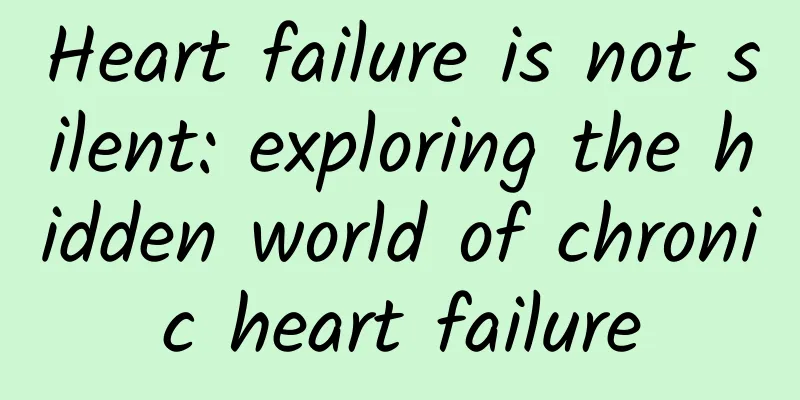Heart failure is not silent: exploring the hidden world of chronic heart failure

|
Author: Sun Xinglan, deputy chief nurse of the Second Affiliated Hospital of Nanchang University Xu Yanjuan The Second Affiliated Hospital of Nanchang University Song Yujie The Second Affiliated Hospital of Nanchang University Reviewer: Qi Hongmei, Chief Nurse, First Affiliated Hospital of Nanchang University On the stage of life, the heart is like a tireless dancer, carrying the weight and hope of life with every beat. However, when the dancer's steps slow down, or even stumble occasionally, a disease called "chronic heart failure" (commonly known as chronic heart failure) quietly appears and becomes an invisible killer threatening health. This article will unveil the mystery of chronic heart failure, take you into this complex and secretive medical field, and understand its causes, manifestations, diagnosis, treatment and care. 1. Chronic heart failure: a hidden worry in life Chronic heart failure is a pathological state in which heart function gradually declines and cannot meet the body's daily metabolic needs. It is a serious manifestation or late stage of all heart diseases. It does not happen overnight, but is the result of the long-term accumulation of multiple heart diseases, such as coronary heart disease, hypertension, cardiomyopathy, etc. These diseases will gradually make the heart lose its vitality. In the early stages of heart failure, the symptoms are often mild, or even without obvious discomfort, but as time goes by, its harm gradually becomes apparent, like boiling a frog in warm water, causing people to fall into a health crisis without knowing it. Figure 1 Copyright image, no permission to reprint 2. Causes of chronic heart failure: multiple factors intertwined The causes of chronic heart failure are complex and diverse, mainly including myocardial damage, cardiac overload, arrhythmia, etc. The interaction of these factors leads to changes in the structure and function of the heart, which eventually causes heart failure. It is worth noting that many patients with heart failure have a long history of heart disease or bad lifestyle habits before the onset of the disease, such as poor control of blood pressure, blood sugar, and blood lipids, long-term smoking and drinking, and lack of exercise, which are all potential risk factors for heart failure. 3. Symptoms appear: warnings that cannot be ignored As heart failure progresses, patients will experience a series of obvious symptoms, such as dyspnea, fatigue, edema, etc. These symptoms not only affect the patient's daily quality of life, but may also indicate the deterioration of the disease. Therefore, once these symptoms occur, you should seek medical attention in time and receive professional examinations and treatment. Figure 2 Copyright image, no permission to reprint 4. Precision medicine: formulation of personalized treatment plans Developing personalized treatment plans based on individual differences in patients with chronic heart failure is the cornerstone of comprehensive care. This includes comprehensive consideration of drug therapy, non-drug therapy (such as cardiac resynchronization therapy, implantable cardiac defibrillator, etc.), and traditional Chinese medicine conditioning, etc., based on the patient's etiology, severity of the disease, comorbidities and other factors. Through precision medicine, we strive to achieve the best treatment effect. 5. Lifestyle intervention: starting with the details Lifestyle intervention is an integral part of the management of patients with chronic heart failure. 1. Adjust your diet to a low-salt, low-fat diet, avoid overeating, and avoid consuming large amounts of fluid to reduce the burden on your heart. 2. Exercise moderately: Develop a suitable exercise plan based on the patient's physical condition, such as walking, Tai Chi, etc., to enhance cardiopulmonary function. 3. Quit smoking and limit alcohol consumption. Tobacco and alcohol are harmful to the heart. It is recommended to quit smoking (including e-cigarettes), quit drinking or avoid heavy drinking, especially for patients with alcoholic cardiomyopathy. 4. Psychological adjustment: Maintain a positive and optimistic attitude, provide psychological support and psychological counseling, and help patients relieve negative emotions such as anxiety and depression. 6. Monitoring and follow-up: protecting every moment of health Establish health records, regularly monitor vital signs, cardiac function indicators, etc., to timely understand changes in the condition and adjust treatment plans. At the same time, strengthen self-management training, such as correctly measuring blood pressure and pulse rate, so that patients can also pay attention to their health in daily life. In addition, regular follow-up examinations are also an important part of ensuring the effectiveness of treatment. 7. Family and community support: building a comprehensive caring network The rehabilitation of patients with chronic heart failure cannot be separated from the support of family and society. Family members should actively participate in the patient's care process, provide emotional support and daily care. At the same time, community medical institutions should also strengthen their attention and guidance to patients with chronic heart failure, and provide convenient medical services and health education resources. By building a comprehensive caring network, a warm, harmonious and hopeful rehabilitation environment can be created for patients. Figure 3 Copyright image, no permission to reprint Although chronic heart failure is secretive and complex, as long as we are vigilant, scientifically prevent and treat, and provide all-round care, we can effectively reduce its harm. Let us work together to protect heart health and keep the tree of life evergreen. Remember, heart failure is not silent, and our care and actions are the loudest response to it. |
<<: How much running should be maintained per week to stay healthy?
>>: Why does the doctor ask you to check your blood homocysteine?
Recommend
How to relieve bland taste in the mouth during pregnancy
Pregnancy is an inevitable stage in life for both...
Female gonorrhea HD pictures
If you have a disease like gonorrhea. In fact, it...
What is the name of my country's Mars probe? The difference between the sun and Mars
In the solar system, Mars, like other planets, ne...
Pregnant women want to eat spicy food
It is best not to eat spicy strips when you are p...
Older "straight men" have no friends, this is a serious study
In 2014, Emma Watson launched a campaign called &...
How to care for the cesarean section incision
Natural birth and cesarean section are both commo...
How can humans have high-quality sleep?
One third of a person's life is spent sleepin...
What is the cause of a small amount of bleeding after sex?
Women need to have sex after marriage, in other w...
What are pubic lice?
Pubic lice are a type of flea that lives in pubic...
The 25th National Ear Care Day丨Tinnitus is not necessarily an ear disease
Many patients often complain of tinnitus when the...
If you have cataracts, you must not put it off!
Cataract is a common eye disease. As people age, ...
What is the injection for inducing labor?
Induced labor and abortion are two ways to end a ...
Discharge from nipple during pregnancy
When a pregnant mother thinks about her pregnancy...
What are the symptoms of kidney deficiency in girls?
Let me introduce to you several symptoms of kidne...
How many days is normal for abdominal pain after miscarriage
In modern society, the probability of unwanted pr...









